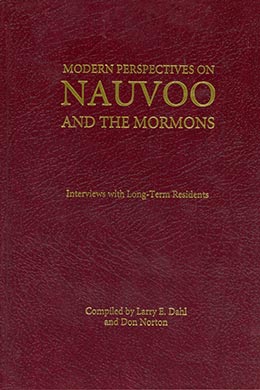Oral History Project
Larry E. Dahl and Don Norton, comps., Modern Perspectives on Nauvoo and the Mormons (Provo, UT: Religious Studies Center, Brigham Young University, 2003), xiii-xiv.
Fall 2001
Purpose
Nauvoo and surrounding areas have a rich and colorful past and present. Several distinct groups of people have contributed to that history. Some came and left after a few short years, as did the Mormons, or members of The Church of Jesus Christ of Latter-day Saints (1839–46). Others came and have stayed for generations. Once a bustling city of many thousands of people. Nauvoo is currently a quiet, peaceful, midwestem city of about 1,200 citizens. Many of those citizens are descendants of those who came early in Nauvoo’s history. From their own experiences, and from information handed down through generations, they are conversant with historical events, perceptions of what were the causes of conflict and violence that led to the Mormon exodus, interesting stories about individuals and families of that early period and since. The purpose of this project is to capture and preserve such information. The intent is to record interviews with local citizens, transcribe those interviews, have the person interviewed review the transcription, then produce an edited, approved copy of the interviews. Final, approved copies of the interviews will then be given to those interviewed, the Nauvoo Historical Society, and the Nauvoo Public Library. Making the interviews publicly available requires the approval of those interviewed. Therefore, they will be asked to sign a release form for such purposes.
Procedure
The interviews will be conducted by Brigham Young University students enrolled in an oral history course at the BYU Semester in Nauvoo program, fall semester, beginning in September 2001. Where possible, the students will be accompanied by a member of the Nauvoo Historical Society or some local citizen who is family or friend or an acquaintance of the person being interviewed. Several days before the interview some questions to guide the interview will be provided to those being interviewed so that there are no surprises or questions the person would prefer not to discuss. Also, those interviewed should feel free to speak about things not included in the questions provided. The goal is to record information that accurately reflects the understanding and feelings of those being interviewed whether that information reflects positively or negatively on the Mormons or others.
